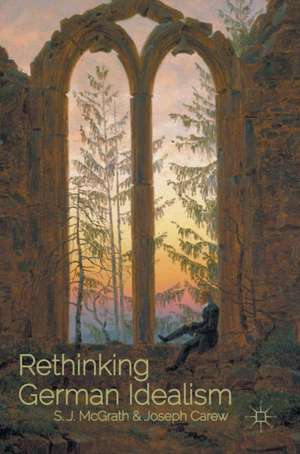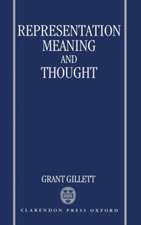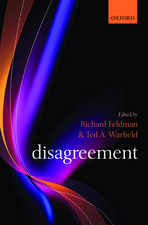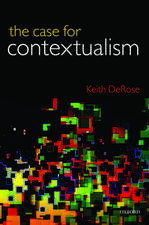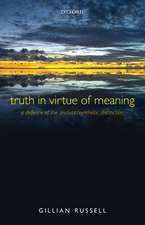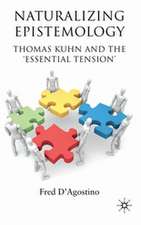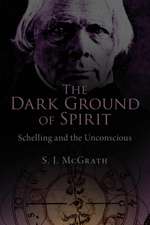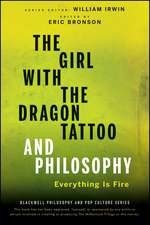Rethinking German Idealism
Editat de S. J. McGrath, Joseph Carewen Limba Engleză Hardback – 5 iul 2016
Drawingtogether new and established voices from scholars in Kant, Fichte, Hegel,and Schelling, this volume offers a fresh look on this time-honouredtradition. It uses myriad of recently developed conceptual tools to present new and challenging theories of its now canonical figures.
Preț: 702.24 lei
Preț vechi: 826.16 lei
-15% Nou
Puncte Express: 1053
Preț estimativ în valută:
134.38€ • 140.65$ • 111.84£
134.38€ • 140.65$ • 111.84£
Carte tipărită la comandă
Livrare economică 31 martie-14 aprilie
Preluare comenzi: 021 569.72.76
Specificații
ISBN-13: 9781137535139
ISBN-10: 113753513X
Pagini: 294
Ilustrații: XI, 352 p. 1 illus. in color.
Dimensiuni: 148 x 210 x 25 mm
Greutate: 0.57 kg
Ediția:1st ed. 2016
Editura: Palgrave Macmillan UK
Colecția Palgrave Macmillan
Locul publicării:London, United Kingdom
ISBN-10: 113753513X
Pagini: 294
Ilustrații: XI, 352 p. 1 illus. in color.
Dimensiuni: 148 x 210 x 25 mm
Greutate: 0.57 kg
Ediția:1st ed. 2016
Editura: Palgrave Macmillan UK
Colecția Palgrave Macmillan
Locul publicării:London, United Kingdom
Cuprins
Notes on Contributors.- Introduction:What Remains of German Idealism?: Joseph Carew and S. J. McGrath.- 1. Kant’s Philosophy of Projection: TheCamera Obscura of the Inaugural Dissertation of 1770: Constantin Rauer (translated by MichaelKolodziej).- 2. The Meaning of TranscendentalIdealism in the Work of F. W. J. Schelling: Alexander Schnell (translated by Heidi A.Samuelson).- 3. ‘Animals, Those Incessant Somnambulists’: ACritique of Schelling’s Anthropocentrism: Devin Zane Shaw.- 4. The Non-Existence of the Absolute:Schelling’s Treatise On Human Freedom: Cem Kömürcü.- 5. Disorientation and Inferred Autonomy: Kant andSchelling on Torture, Global Contest, and Practical Messianism: .- 6. The Beech and the Palm Tree: Fichte’sWissenschaftslehre as a Project ofDecolonization: Jean-Christophe Goddard (translated byKyla Bruff).- 7. Hegel on the Universe of Meaning: Logic,Language, and Spirit’s Break from Nature: Joseph Carew.- 8. Lack and the Spurious Infinite: Towardsa New Reading of Hegel’s Philosophy of Nature: Wes Furlotte.- 9. Absolutely Contingent: SlavojZizek and the Hegelian Contingency of Necessity: Adrian Johnston.- 10. On the Difference Between Schellingand Hegel: S. J. McGrath.- 11. And Hence Everything is Dionysus:Schelling and the Cabiri in Berlin: Jason M. Wirth.- 12. Beyond Modernity: The LastingChallenge of German Idealism: Konrad Utz.- Bibliography.- Index
Notă biografică
JosephCarew is a PhD Candidate in Philosophy at McGill University and an emergingfigure in German Idealist studies. He is the author of Ontological Catastrophe: Zizek and the Paradoxical Metaphysicsof German Idealism (Open HumanitiesPress, 2014).
S.J. McGrath is a Professor of Philosophy at Memorial University ofNewfoundland. He is an internationally recognized specialist in the philosophyof religion and the history of philosophy. His most recent book is The DarkGround of Spirit: Schelling and the Unconscious (Routledge, 2012).
S.J. McGrath is a Professor of Philosophy at Memorial University ofNewfoundland. He is an internationally recognized specialist in the philosophyof religion and the history of philosophy. His most recent book is The DarkGround of Spirit: Schelling and the Unconscious (Routledge, 2012).
Textul de pe ultima copertă
The ‘death’ of German Idealism has been decried innumerable times since its revolutionary inception, whether it be by the 19th-century critique of Western metaphysics, phenomenology, contemporary French philosophy, or analytic philosophy. Yet in the face of two hundred years of sustained, extremely rigorous attempts to leave behind its legacy, German Idealism has resisted its philosophical death sentence. For this exact reason it is timely to ask: What remains of German Idealism? In what ways does its fundamental concepts and texts still speak to us?
Drawing together new and established voices from scholars in Kant, Fichte, Hegel, and Schelling, this volume offers a fresh look at this time-honoured tradition. It uses a myriad of recently developed conceptual tools to present new and challenging theories of its now canonical figures.
